Most believe David Cameron will campaign for Britain to remain an EU member whatever the outcome of his negotiations
No real change in support for Britain staying in the EU from October
Most Britons believe that David Cameron will campaign for Britain to stay in the European Union after his negotiations with other European leaders, according to Ipsos’s latest Political Monitor, even though only 18% think he will achieve all or most of his goals. The survey reveals that 68% think the Prime Minister will campaign for Britain to remain a member in the upcoming referendum (including both 73% of Conservative supporters and 71% of supporters of other parties), while 17% think he will campaign for Britain to leave (just 1% thinks he will remain neutral).
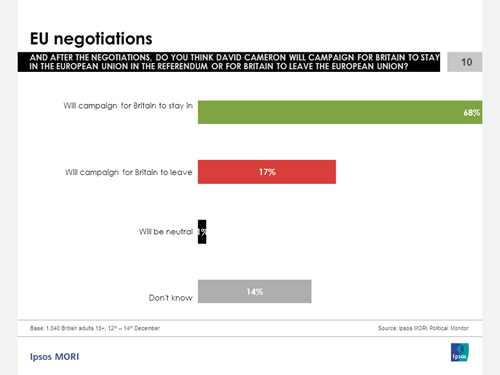
Although most believe Mr Cameron will campaign for Britain to remain an EU member the public still show little confidence that he will get a good deal for Britain in his negotiations. One in three (34%) Britons are confident in him getting a good deal (down four points from June) versus 63% who are not (up six points from June). David Cameron’s own party supporters have most faith in him with just over half (53%) of Conservative supporters saying they’re confident in him, although however 46% are not confident. This compares to 28% of Labour supporters saying they’re confident in the Prime Minister (69% are not confident) and 38% of Liberal Democrats (56% are not confident). UKIP supporters however express the most doubt in David Cameron where just one in ten (10%) say they have confidence in David Cameron getting a good deal for Britain while nine in ten (90%) say they’re not confident.
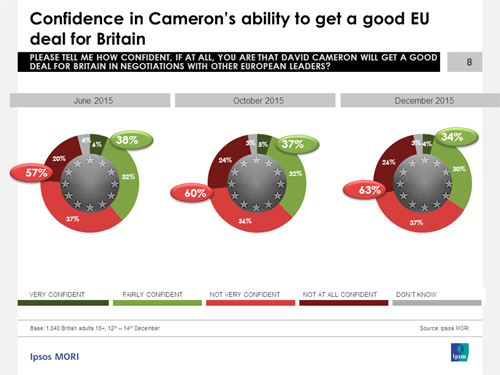
While the public show little confidence in the Prime Minister during the negotiations they do not believe he’ll necessarily come back empty handed, but nor do they think he will be particularly successful. Most (64%) think Mr Cameron will achieve a few of his goals but just 17% think he will achieve “most” and only 1% think he will achieve all of them. Thirteen percent say he will achieve none of them.
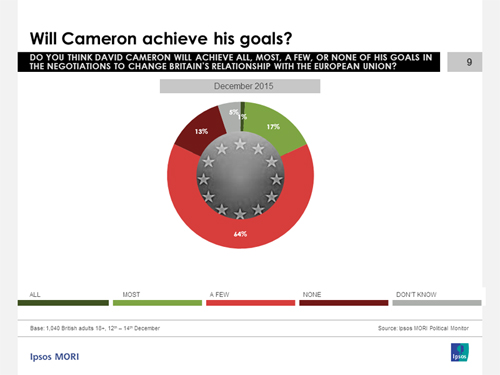
The survey also shows that there has been no significant change in the past couple of months on where the public stand on Britain’s membership of the EU. Our long term trend question shows 53% in favour of Britain staying in the EU (up one point) and 36% who want to ‘get out’ (down three points). This is split-sampled with the actual referendum question which finds six in ten (58%) saying they would vote to remain a member of the EU while 32% would vote to leave (compared with 52% to 36% in October). It should be noted neither of these are statistically significant changes.
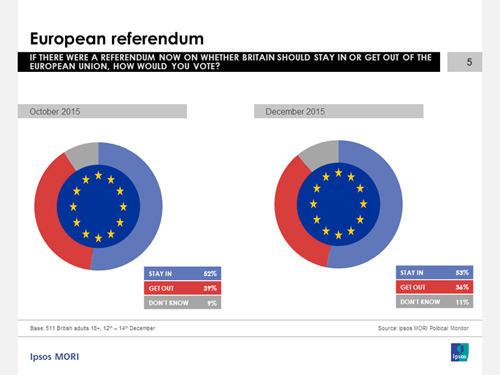
When it comes to lowering the voting age for the EU referendum the public have mixed views depending on how the question is asked. When asked if they support or oppose “giving 16 and 17 year olds the right to vote” in the referendum half (52%) support the idea while 41% oppose it. However when asked if they support or oppose “reducing the voting age from 18 to 16” for the referendum those supporting the proposal drops to 37% with 56% opposing.
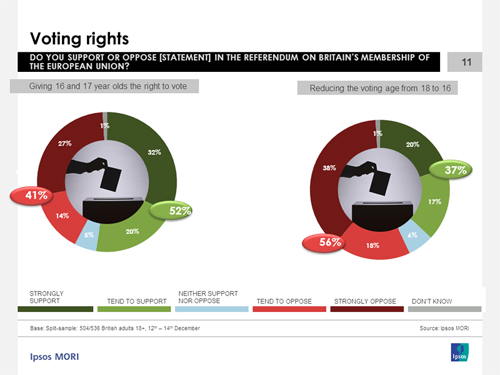
Our ongoing vote intention figures still show a Conservative lead over Labour. The Conservatives currently stand at 38% compared to Labour with 31%, the Liberal Democrats at 9% and UKIP at 9%.
Gideon Skinner, Head of Political Research at Ipsos, said:
“It doesn’t matter if they think the Prime Minister will achieve most of his negotiation goals or not - most Britons are pricing in to their expectations that David Cameron will campaign for Britain to stay in the EU. Meanwhile, there has been no real change in their views of Britain’s membership of the EU in the last couple of months – but our long-term trends show that attitudes to Europe can move, perhaps especially as the referendum campaign begins to focus their minds.”
Technical note:
Ipsos interviewed a representative sample of 1,040 adults aged 18+ across Great Britain. Interviews were conducted by telephone 12-14 December 2015. Data are weighted to match the profile of the population.


